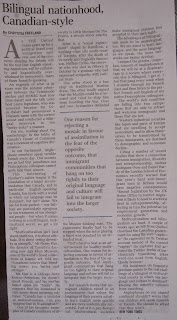On 23 March 2015 at 0318H, Mr Lee Kuan Yew, founding father of Singapore and the nation's longest-serving Prime Minister, passed away at the age of 91. The country is observing seven days of mourning for this giant of a man.
One of the policies that Mr Lee implemented was bilingual education. All basic education was conducted in English, and every child from the day he entered school had to learn his mother tongue i.e. Chinese students learned Mandarin, Malay students learned Malay, and Indian students learned Tamil.
For many of us, especially those from English-speaking homes, learning a second language, namely Mandarin, was a nightmare. Myself included. Apart from weekly lessons in school, we never heard Mandarin or had any opportunity to use the language. Tuition in Mandarin was not an option for us, but oh, how I hated the lessons! My classmate vividly remembers me reading an English storybook hidden inside my Chinese textbook during Chinese class, a fact that I have long since forgotten.
Learning Mandarin was to pass the exams with a decent grade so that I could get into a local university. Barely scraping by was more like it for me. I wrote essays using the English grammatical structure and thought pattern. Idioms and proverbs did not exist in my vocabulary. I was an anglophile.
Working in a predominantly Chinese-speaking office many years after leaving school was a culture shock. Not only did I now have to communicate in simple English to be understood, I had to read the Chinese newspapers daily as part of my job! This is where I learned to match the photos in the English and Chinese newspapers, then figure out the headline. It was torture.
Then I switched jobs to an English-speaking office environment. I had a colleague who took on the job of reading the Chinese newspapers. She went to a very good bilingual primary school. When we had to host visitors from China, she took the lead. We learned all the technical terms and facts and figures, and managed to do a fairly good job of leading tours in Mandarin. When I needed to do a television interview in Mandarin, she wrote the script and I rattled it off in front of the camera. When the interview was broadcast, she said I sounded just like her, until she realised that she had written the script for me!
Fast forward to today. Many of my friends praise me for my linguistic ability. While English is and will probably always be, my most proficient language, I can operate decently in four other languages. I put in the effort to learn how to speak, read and write each of those languages so that I would have a complete picture, rather than only learning to speak. I am still on the learning journey.
In honour of Mr Lee Kuan Yew and his bilingual education policy, may I say "thank you from the bottom of my heart" for forcing me to get on the bilingual road. I would not be here today if not for you.
Mr Lee, rest in peace. Rest assured that generations of Singapore-educated people will carry on the torch for bilingual education into the future.
Thank you, Mr Lee Kuan Yew. You will be missed.
#rememberingleekuanyew
(Photo credit: Ministry of Education, Singapore)





















